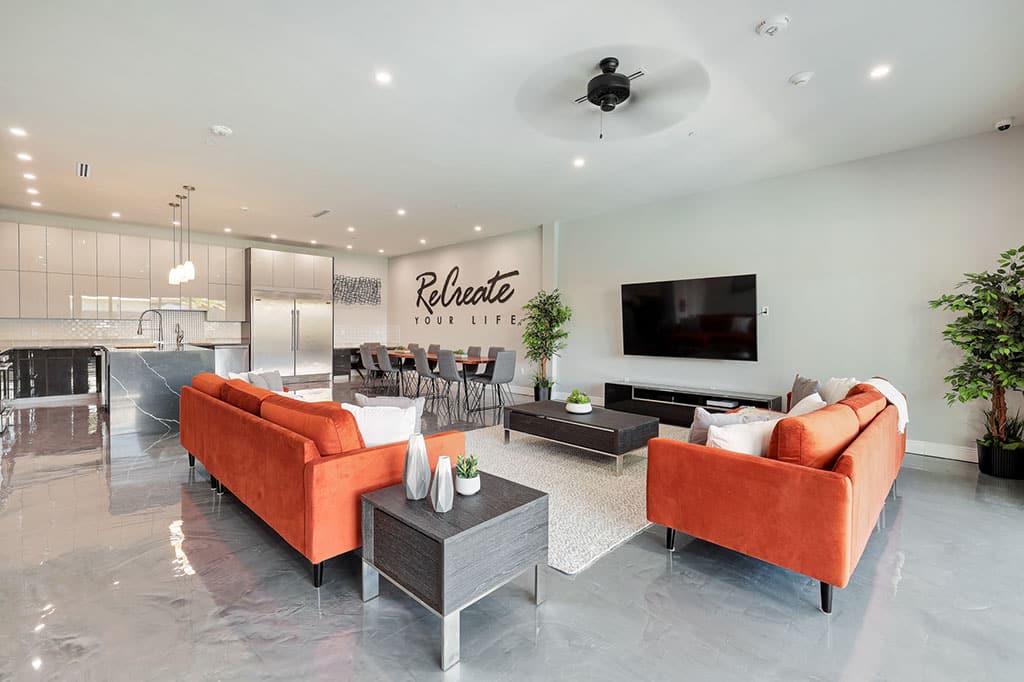Treatment of addiction can be a tricky and complex challenge but it’s achievable if you take the right approach when it comes to choosing the right treatment method.
Since the consequences of addiction are varied and far-reached, intensive medical attention is usually necessary, especially during the early phases of treatment, and that’s where some facilities recommend inpatient/residential addiction treatment. Even therapies such as cognitive-behavioral therapy(CBT) and/or dialectical behavior therapy(DBT).
If you want to find out more about this method of treatment, how it works, and whether it’s the right choice, this guide will walk you through everything you need to know.

What Is Residential Addiction Treatment?
Residential treatment, also known as “in-patient treatment” is a form of rehabilitation and recovery treatment for different types of addiction.
As the name suggests, in this type of treatment, substance use disorder patients are admitted to the medical facility to receive treatment for addiction throughout its stages, including
- Diagnosis and medical history review
- evaluation of the current situation of the admitted patient
- Mapping out a personalized medical treatment plan
- Medical support during withdrawal symptoms
- Offering consultation for patients and their loved ones (upon permission)
- Providing counseling and therapy sessions for patients, whether individual or group sessions.
Residential addiction treatment is carried out in facilities like medical and rehab centers where patients are offered accommodation during the treatment period.
These facilities are designed so that they provide a controlled, stress-free environment for patients to overcome the urges associated with substance use disorders.
The layout of these facilities may vary depending on the luxury level of the residential treatment center, ranging from ones with setups similar to hospitals all the way to those that resemble spas and health clubs. However, the core medical aspect of these facilities is always the same.
Regardless of the setup of these facilities, they always provide a full team of professionals that are available around the clock, including physicians, psychiatrists, nurses, nutritionists, fitness trainers, security, etc.

Prevalence of Residential Addiction Treatment
According to a recent report by Statista, the number of substance abuse treatment facilities in the U.S. has grown from around 13,000 to 16,000 in the last decade.
Another report by the Substance Abuse and Mental Health Services Association reveals that around 4.2 million people (aged 12 or above) received treatment for addiction in 2019.
The same report shows that around 2.6 million people received inpatient/residential substance abuse treatment, which makes up around 61% of all the patients who received treatment within the same period.
The uplifting news here is that many studies associated residential/inpatient addiction treatment with higher chances of treatment success, especially when continuous care is provided upon discharge.
Is Residential Addiction Treatment Necessary?
While residential addiction treatment isn’t always necessary, especially in mild cases of substance abuse, it can greatly improve the success rate of any addiction treatment, as previously established above.
With that being said, in some severe cases, residential addiction might be critical for the success of treatment, especially for substance use disorders associated with severe withdrawal symptoms and require continuous medical supervision, such as:
- Opioid addiction
- Highly addictive stimulants like methamphetamines
- Severe alcoholism

What Are the Characteristics of Residential Addiction Treatment?
Residential addiction treatment is characterized by some core aspects that are necessary to ensure the efficacy of the treatment method. Here’s a quick look at each one of them and how they contribute to the treatment.
24/7 Medical and Therapeutic Support
One of the main aspects that set inpatient addiction treatment apart from other types of addiction treatment is the continuous availability of support around the clock.
Like regular inpatient hospitals, residential addiction treatment centers will have staff members available to help patients day and night.
This aspect is one of the primary reasons why spending withdrawal periods from severe addictions in rehab centers is quite common.
This way, medical teams can keep track of all the symptoms around the clock and act immediately whenever necessary to reduce the discomfort associated with the withdrawal period.
Structured Treatment Programs
When patients suffering from substance use disorder are admitted to residential addiction treatment centers, the medical team will evaluate the situation to plan the most effective treatment strategy.
However, planning the treatment strategy may require observation of the patient. In that case, having the patient under supervision during the initial phase allows for a more structured treatment, which can greatly improve the chances of treatment success.
Integration of Behavioral Therapies
Treatment of addiction involves a wide range of methods, including physical and psychological treatment.
In fact, behavioral therapy is one of the fundamental aspects when it comes to treatment success because it helps patients with the following:
- Overcome social anxiety associated with substance use disorders
- Learn essential interpersonal skills to maintain impulse control
- Avoid succumbing to triggers and urges that push them to relapse
- Abolishing their addictive patterns and replacing them with more positive approaches while seeking solutions
With continuous supervision of the patient’s condition, medical teams can integrate these forms of therapy whenever necessary for a more effective treatment
Group and Individual Therapy Sessions
As previously mentioned, addiction isn’t only solved by medication. One of the best ways to overcome the urge to abuse drugs is through counseling and therapy sessions.
These sessions can take various forms, whether it’s one-on-one with a psychiatrist or within a group that shares a common form of addiction. Some common modalities include trauma therapy, equine therapy, art therapy, and various kinds of experiential therapies.
These methods are highly effective, especially at the beginning of treatment. However, they can be time-consuming and hard to attend when you’re an out-patient.
On the other hand, rehab centers offer a more flexible schedule for residents so that they’re not missing out on essential therapy sessions.

What Are the Advantages of Residential Addiction Treatment?
Residential addiction treatment offers a unique and highly effective approach when it comes to overcoming addiction. Here’s a quick look at all the advantages and benefits it can offer to substance use disorder patients.
Offers a Safe and Supportive Environment for Treatment
One of the best things about inpatient addiction treatment facilities is that it’s specifically optimized to offer the necessary support for substance abuse disorder patients.
The medical staff is quite knowledgeable and helpful with plenty of experience in dealing with addiction and its repercussions.
This allows them to offer the maximum level of support to patients and make them feel safe and motivated to tolerate the challenges of addiction treatment.
Removal from Triggers and Temptations
Among the primary reasons why addiction treatment is difficult is being surrounded by constant triggers and stressing factors that may drive the urge to abuse drugs.
In fact, being exposed to the same environment that led to addiction in the first place is one of the major drawbacks of treating addiction at home.
This doesn’t only apply to substance addiction but behavioral problems and addiction as well (such as gambling or social media addictions).
On the other hand, most of these rehab facilities are designed so that they’re completely free of stressors and other triggers that may cause patients to relapse and use drugs.
Provides Intensive Therapy for Severe Cases
The severity of withdrawal symptoms depends on a broad range of factors, such as the type of abused substance
- The current dose of the substance
- How long the drug abuse disorder has been going
- Genetics and individual differences
For example, patients who are recovering from severe alcoholism or opioid addiction may go through intense withdrawal symptoms, such as seizures and extreme anxiety.
In that case, medical professionals may prescribe essential treatments to address those symptoms, such as anticonvulsants and benzodiazepines.
Some of these symptoms are heavily time-sensitive, which is why treating these forms of addiction in medical centers is highly recommended.
Creates Personalized Treatment Plans
Treating addiction is a complicated process that involves a multitude of approaches. In fact, this is also the reason why the causes of addiction are documented but not fully understood.
In other words, what may work on a certain individual while treatment may not work on another person, even if both of them are going through the same form of addiction.
That’s why creating an individualized treatment plan is necessary for a successful treatment, and that’s where inpatient addiction treatment stands out.
With continuous monitoring of the case, evaluation of the condition is much easier and results in a more effective treatment, which reduces the chances of relapses after treatment.

Types of Residential Addiction Treatment Programs
Inpatient addiction treatment programs are classified into different types depending on their duration and the nature of the treatment. Here’s a quick look at the different types and how they work:
Short-term Residential Treatment
In this type of treatment, patients are admitted to the medical center for a period of residence that ranges between 30 to 90 days.
The main purpose of this residential treatment is to receive full medical attention during the withdrawal period as well as an initial introduction to behavioral therapy sessions.
Short-term residential treatments are suitable for relatively mild cases of substance use disorders as well as a behavioral addiction.
The short duration of admission makes it quite flexible and suitable for those who find it hard to commit to long-term inpatient therapy.
Long-term Residential Treatment
Long-term residential addiction treatment is specifically designed for patients with severe forms of addiction, such as opioid use disorder and severe alcoholism.
The treatment program usually takes longer than 90 days or more. In fact, some of them may even take longer than a year.
These programs are also suitable for patients who are extremely sensitive to triggers and/or suffer from chronic relapsing after treatment.
Dual Diagnosis Residential Treatment
This type of residential treatment is specifically designed for patients with co-existing conditions, which are patients who suffer from both addiction and mental health issues. These mental illnesses include but are not limited to:
- Depression
- Anxiety
- Bipolar disorder
- Borderline personality disorder
- Psychosis and mania
Treatment of patients with co-existing conditions requires extra attention while administering medication, as they usually require the use of certain psychoactive drugs while treating addiction.

The Admission Process for Residential Addiction Treatment
The process of admission to an addiction treatment center usually involves the same steps regardless of the type of treatment program. A rough outline of these steps includes:
1. Assessment and Evaluation
After receiving an application for admission to the facility, medical professionals will perform a full assessment of the condition to review its severity and the best course of action during treatment.
2. Exploring Payment Options and Insurance Coverage
Evaluating the condition will allow the facility to provide a rough estimation of the cost of the treatment.
Medical centers will usually offer various payment options to facilitate the process. Make sure that you enquire about insurance coverage if you have one, which can massively cut the costs of treatment.
3. Family Involvement and Support
Lastly, since family support is extremely essential for addiction treatment, families will be presented with a visiting schedule that allows them to stay in continuous contact with their loved ones. This schedule varies depending on the case’s condition and progression.

Challenges of Residential Addiction Treatment
Despite all the merits associated with residential addiction treatment, it’s not ideal for everyone and has some challenges and downsides, including:
Cost of Treatment
Residential care is more expensive because it involves accommodation, food, and more. Access to additional services and the luxury status of the facility can massively impact the overall costs as well.
Time Commitment
As previously established, inpatient treatment requires partial or full isolation from external triggers for a long time.
For that reason, some patients might be hesitant to receive treatment in a medical center, especially if they have a tight professional or academic schedule
Adjusting to the Treatment Environment
During treatment, patients will need to spend a lot of time in a new environment that can be somewhat restrictive to protect them from triggers.
Unfortunately, some patients may have a hard time adjusting to all these sudden changes, especially with unpleasant withdrawal symptoms involved.

Final Thoughts
Inpatient/Residential addiction treatment is one of the most effective methods to treat substance use disorders, especially for severe and chronically relapsing cases.
It provides a personalized treatment plan for every patient along with medical attention around the clock.
If you or your loved ones are suffering from substance abuse, please don’t hesitate to receive immediate medical help.
Early treatment can massively improve the success rate of the treatment by helping medical and mental health professionals create a more effective plan.
FAQ
What is residential addiction treatment?
How long does residential treatment last?
What types of services are provided in residential treatment?
How does residential treatment differ from outpatient treatment?
Is residential treatment more effective than outpatient treatment?
How much does residential treatment cost?
How do I choose the right residential treatment program?
Can family members visit during residential treatment?
What is the daily schedule like in residential treatment?
What happens after residential treatment?








